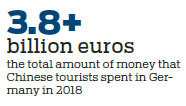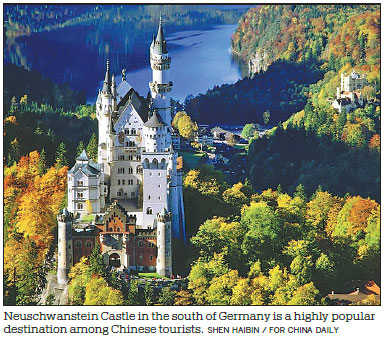Prospering bilateral ties bring in more tourists
Improved business and political ties have led to increased tourism for both Germany and China, allowing the people of both countries to better understand and experience different cultures. Tourism experts say they expect that trend to continue.
Chinese tourists spent over 3.8 billion euros ($4.19 billion) in Germany in 2018, and China remains the second-largest overseas market for Germany as a travel destination after the United States, data from the German National Tourist Board, or GNTB, show.

In 2018, the number of overnight stays by Chinese tourists in Germany was 3.02 million, an increase of 5.6 percent over 2017. Germany expects to have 5 million annual overnight stays by Chinese visitors by 2030.
Dai Bin, head of the Beijing-based China Tourism Academy, said Germany has an excellent reputation in China as a cultural superpower, and deservedly so.
Dai said many German orchestras perform regularly in China. Artworks from both the past and present, are showcased in China, and German artists hold many successful exhibitions.
Eager to grab greater market share, all major airlines in both countries, such as Air China and Lufthansa, operate direct flights to each other's major cities.
According to research by Beijing Normal University released in March, the majority of Chinese tourists heading overseas have middle to high incomes, with 75 percent spending between 5,000 to 20,000 yuan ($747-$2,988) per person on their travels in Europe last year. Many tend to choose self-planned and customized vacations, as well as sport-related holidays.
Zhang Yuxin, a business professor at Nankai University in Tianjin, said much of the growth in Germany's tourism sector was being driven by visitors from Asia. These included tourists from China, South Korea and India in recent years.
According to China Tourism Academy's findings, Frankfurt, Dusseldorf, Berlin, Munich, Stuttgart and Leipzig have become popular destinations for Chinese tourists, with about half of them choosing to stay in five and four-star hotels during their visits.
"We also found that many Chinese tourists prefer to visit Germany, Austria and Switzerland together when making their travel plans because they are close to each other.
"The rapid advance in technology in recent years gives Chinese users instant access to real-time information on almost any topic," Zhang added.
The GNTB and Chinese mobile payment giant Alipay recently teamed up to hold the first German Shopping Festival to attract Chinese tourists to shop in Germany.
Using the Alipay app, shoppers who travel to Germany can browse different stores from a city map, read shopping tips in Chinese, receive electronic discount coupons and join in a lucky draw for various prizes.
In some restaurants in Germany, tourists can also use Alipay to scan QR codes and place orders on their smartphone, just like in China.
Li Zhaohui, director of the GNTB's Beijing office, said it is critical to improve the shopping experience for Chinese visitors, for instance, to allow them to use a way they are familiar with when paying for purchases.
"Germany remains one of the favorite European destinations for Chinese visitors. There are more direct flights between China and Germany compared with other European countries," Li said.
The GNTB plans to open a store on Alibaba's Tmall online shopping platform to sell German brands that are not so well-known to Chinese consumers.
zhongnan@chinadaily.com.cn

(China Daily 09/07/2019 page10)














